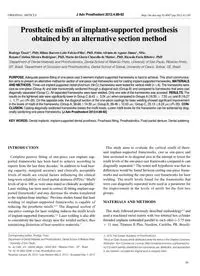
PMC3381208-jap.2012.4.2.89 PDF
Preview PMC3381208-jap.2012.4.2.89
INTRODUCTION Complete passive fitting of one-piece cast implant sup- ported frameworks has been hard to achieve according to reports from the last three decades.1 In addition to load bear- ing capacity, marginal accuracy and clinically acceptable levels of misfit are crucial factors influencing the clinical long-term reliability of fixed partial dentures (FPDs).2 Misfit levels of up to 100 ㎛ were once stated as clinically acceptable.3 Laser welding has been used to correct ill-fitting implant-sup- ported frameworks4 and may decrease the strains transferred to the implant-bone interface.5 Previous studies found that laser welding of implant-supported frameworks is capable of reducing the prosthetic misfit.4,6-8 The diagonal section of one-piece castings for laser welding reduces the misfit levels of implant-supported frameworks.9,10 Laser welding is also able to concentrate the laser energy near the welded surface, thus minimizing distortion of heat-sensitive materials.11 This study aims to evaluate the vertical misfit of three- unit implant-supported frameworks, cast as one-piece and later sectioned in its diagonal axis in the attempt to lower the misfit levels of the one-piece cast frameworks compared to cast diagonally separated.10 The tested null hypothesis was that no differences would be found between casting one-piece frame- works and sectioning the one-piece cast frameworks for laser welding. The misfit levels found for the frameworks that were cast diagonally separated were used as a parameter for the improvement in the levels of misfit for the first two groups. MATERIALS AND METHODS This study followed previously described methodology4,12 and used a machined metal matrix with two internal hex cylinder threaded implants embedded parallel to each other (�3.75 mm × 11 mm, Titamax II Plus, Neodent, Curitiba, PR, Brazil). Prosthetic misfit of implant-supported prosthesis obtained by an alternative section method Rodrigo Tiossi1*, PhD, Hilmo Barreto Leite Falcão-Filho2, PhD, Fa′bio Afra ∧nio de Aguiar Ju′nior1, MSc, Renata Cristina Silveira Rodrigues1, PhD, Maria da Gloria Chiarello de Mattos1, PhD, Ricardo Faria Ribeiro1, PhD 1Department of Dental Materials and Prosthodontics, Dental School of Ribeirão Preto, University of São Paulo, Ribeirão Preto, SP, Brazil, 2Department of Occlusion and Prosthodontics, Dental School of Sobral, University of Ceara′, Sobral, CE, Brazil PURPOSE. Adequate passive-fitting of one-piece cast 3-element implant-supported frameworks is hard to achieve. This short communica- tion aims to present an alternative method for section of one-piece cast frameworks and for casting implant-supported frameworks. MATERIALS AND METHODS. Three-unit implant-supported nickel-chromium (Ni-Cr) frameworks were tested for vertical misfit (n = 6). The frameworks were cast as one-piece (Group A) and later transversally sectioned through a diagonal axis (Group B) and compared to frameworks that were cast diagonally separated (Group C). All separated frameworks were laser welded. Only one side of the frameworks was screwed. RESULTS. The results on the tightened side were significantly lower in Group C (6.43 ± 3.24 ㎛) when compared to Groups A (16.50 ± 7.55 ㎛) and B (16.27 ± 1.71 ㎛) (P<.05). On the opposite side, the diagonal section of the one-piece castings for laser welding showed significant improvement in the levels of misfit of the frameworks (Group A, 58.66±14.30 ㎛; Group B, 39.48±12.03 ㎛; Group C, 23.13±8.24 ㎛) (P<.05). CON- CLUSION. Casting diagonally sectioned frameworks lowers the misfit levels. Lower misfit levels for the frameworks can be achieved by diag- onally sectioning one-piece frameworks. [J Adv Prosthodont 2012;4:89-92] 89 KEY WORDS: Dental implants; Implant-supported dental prosthesis; Prosthesis fitting; Prosthodontics; Fixed partial denture; Dental soldering Corresponding author: Rodrigo Tiossi Department of Dental Materials and Prosthodontics, Dental School of Ribeirão Preto - University of São Paulo, Av. do Cafe′, s/n - Monte Alegre, 14040-904 - Ribeirão Preto - SP - Brazil Tel. 55 16 3602 4046: e-mail,
